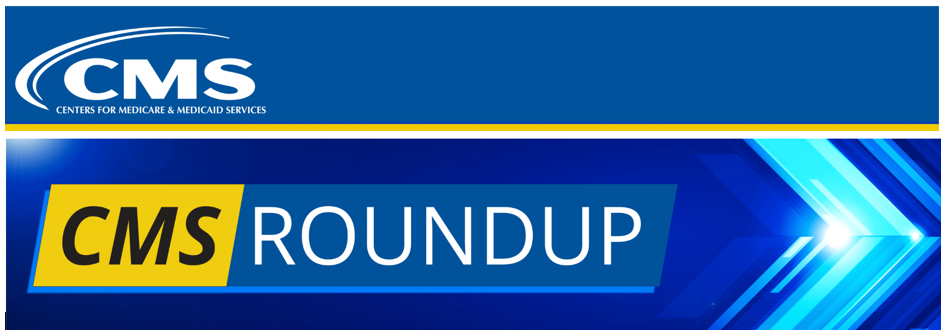
Today, the Centers for Medicare & Medicaid Services (CMS) is providing an at-a-glance summary of news from around the agency:
“First, Do No Harm”: CMS Shares How it is Pursuing its Zero-Harm Goal to Keep Patients Safe
March 16: CMS is pursuing a zero-harm goal to keep patients safe when receiving care, using the many tools and authorities at its disposal, and in partnership with providers, payer and patient advocates. The agency shared all the details in a blog published in observance of National Patient Safety Week.
Joint Statement on Implementation of Transformational Home- and Community-Based Services Settings Regulation
March 17: CMS released a joint statement with the Administration for Community Living to mark an important milestone that further enables people with disabilities and older adults to live and fully participate in their communities. Effective March 18, 2023, all states must be fully compliant with the Home- and Community-Based Services (HCBS) Settings regulation, which was created to make sure every person receiving Medicaid-funded HCBS has access to quality, person-centered services and is treated with privacy, dignity, and respect. The rule also ensures individuals covered under the program are able to maintain control of decisions that impact their lives regarding visitors, nutrition, personal resources, and more.
Inflation Reduction Act News: CMS’ Drug Pricing Negotiation Timeline Is on Track for 2026
March 20: CMS is moving full steam ahead implementing the Medicare Drug Price Negotiation Program under the Inflation Reduction Act (IRA). This week, CMS published an Information Collection Request for Medicare Drug Price Negotiation Program negotiation data elements. The Inflation Reduction Act specifies nine factors CMS must consider when negotiating the maximum fair price of a selected drug. The new request seeks public input on the particular data to be included in these factors. It also outlines the process for drug companies and the public to submit relevant data. The request is open for a 60-day public comment period. More information can be found here.
CMS Updates Guidance to States for Reviewing Delivery of Home Dialysis in Nursing Homes
March 22: CMS continues to act to improve the safety and quality of care in the nation’s nursing homes, building on the Biden-Harris Administration’s commitment to protecting residents. CMS has updated its guidance to state survey agencies (SAs) for reviewing home dialysis services delivered within a Long-Term Care (LTC) Facility to ensure patients get the reliable, high-quality care they deserve. The revised memorandum aligns CMS guidance to SAs with its Care at Home requirements (42 CFR §494.100); addresses questions and concerns raised during engagements with the provider community and SAs, and ensures the information provided in the guidance reflects existing practices and models of care for delivering home dialysis in the nursing home setting. The guidance can be found here.
CMS Extends Medicare Advantage Value-Based Insurance Design (VBID) Model
March 23: The Center for Medicare and Medicaid Innovation’s Medicare Advantage Value-Based Insurance Design (VBID) Model is being extended through 2025-2030. The extension will introduce changes intended to more fully address the health-related social needs of patients, such as food, transportation and housing insecurity and/or living environment, and enhance the seamless delivery of serious illness care across settings. The model was previously scheduled to end at the end of 2024. Additional information about the model can be found here.
New Cybersecurity Guide Offers Steps to Manage Cyber Risks to Health Care IT Systems
March 8: CMS is encouraging its health care partners to review and consider using the new cybersecurity implementation guide recently released by the HHS Administration for Strategic Preparedness and Response (ASPR), and developed in partnership with the Health Sector Coordinating Council (HSCC) Cybersecurity Working Group. The guide is intended to help the public and private health care sectors prevent cybersecurity incidents by providing specific steps that health care organizations can take immediately to manage cyber risks to their information technology systems. Additional information about the guide and its purpose can be found here.
Other Recent Releases
# # #
CMS, an agency within the U.S. Department of Health and Human Services, serves the public as a trusted partner and steward, dedicated to advancing health equity, expanding coverage, and improving health outcomes. The agency protects public health by administering the Medicare program and working in partnership with state governments to administer Medicaid, CHIP, and health insurance portability standards.
Get CMS news at cms.gov/newsroom, sign up for CMS news via email, and follow CMS on Twitter @CMSgov